Substantial investments in wine have historically generated a strong return on investment. Buying wine not only allows you to diversify your pre-existing portfolio with a low-volatile investment, but it has continued to show a steady return rate of 9% over past years.
Keep reading to learn more about how to start our wine portfolio and make a wise wine investment.
How to Invest in Wine
According to the Knight Frank Wealth Index, fine wines have appreciated in value by over 120% over the past ten years. This makes them a sustainable addition to any investment portfolio. You can invest by shopping on your own or you can skip the hassle and invest through Vint. We take on all of the trouble of selecting, storing, and selling the wines, so all you have to do is make an account and buy shares in collections that interest you.
Buy Your Own Wines
This is the old-school and expensive approach to wine investment. Collecting wines is more of a recreational part of life for the wealthy rather than a reasonable investment vehicle for most people. Building your own portfolio requires large sums of money as you purchase wine by the case (typically 6 - 12 bottles) and need to pay for its storage and insurance.
Vint: The Future of Wine Investment
Vint offers a new solution to wine investing. We work with our team of experts to carefully craft high-value collections of wine and allow investors to buy shares in the collection. This is a great solution both for individuals who want an easy way to get started in wine investing and experienced investors who want to further diversify their wine investment approach.
What Makes a Good Wine Investment
Like any traditional investment, there are risks you assume in putting your money into a product. However, if you choose the right kinds of wines, you can keep this risk relatively low. Here are some of the attributes of good wine investments.
Scarcity of Product
Strong investments are in a product that can't be easily bulk produced. Typically with wines, this means that they are grown in specific regions and produced in relatively small quantities.
Type of Wine
Red wines, sparkling, and white dessert wines are the most common wines for investments. That is because these wine varieties age better. For a long-term investment, red wines are the most common as the best red wines have historically developed and improved with age.
Tips When Wine Collecting for Investment
With any investment, it is important to be careful where you are putting your money. If you are still wondering if wine is a good investment, here are some tips to guide you when making a wine investment.
Beware of Price Volatility
Although wine has remained more stable in price volatility than the traditional stock market, it is important to protect your assets. Before purchasing or selling your product, you should beware of how wine's value is fluctuating.
Consult a Classification System
Purchasing a poor-quality wine is never a good investment. When investing in wine, you should consult a classification system to purchase a high-quality product. Buying a high-quality product will ensure that your fine wine remains in proper condition throughout its life.
Indulge or Invest?
Wines are a safe investment to make to further diversify your portfolio. They are not tied to the volatility of the stock market and are a very suitable form of investment. If you are challenged whether you want to indulge in your wine purchases or invest, just focus on how much you can grow your value over time. Connect with us to learn more about prospective wine investment opportunities.


